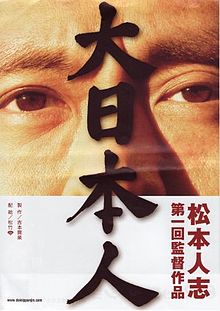- Big Man Japan
-
Big Man Japan
大日本人
Japanese poster artDirected by Hitoshi Matsumoto Produced by Akihiro Okamoto Written by Hitoshi Matsumoto
Mitsuyoshi TakasuStarring Hitoshi Matsumoto
Riki Takeuchi
Ua
Ryūnosuke KamikiMusic by Tōwa Tei Cinematography Hideo Yamamoto Editing by Soichi Ueno Distributed by Phantom Film
ShochikuRelease date(s)  Japan
Japan
June 2, 2007
 Hong Kong
Hong Kong
November 11, 2007
 United States
United States
May 15, 2009Running time 113 minutes Country Japan Language Japanese Big Man Japan (大日本人 Dai Nipponjin) is a 2007 Japanese film written, directed and starring Hitoshi Matsumoto. It was well-received by critics in the U.S., after many months of being shown at various festivals and film events. It has received a "Fresh" score of 78% on Rotten Tomatoes.[1]
Contents
Story
The film takes the form of a mockumentary that follows Masaru Daisato. Through the application of high voltage electricity, Daisato is able to grow to a height of approximately 30 meters. Having inherited from his father the duty of protecting Japan against various giant monsters, Daisato is in employ of a sub-division of the defence ministry called the Ministry of Monster Prevention. Despite his great power, he is regarded as an outcast by his fellow citizens and struggles under the burden of living up to a heroic lineage that increasingly overshadows his own somewhat mediocre accomplishments as a monster fighter. To further complicate matters, he is deeply estranged from his immediate family. By the film’s end, his failures and doubts reach a hallucinogenic apotheosis.
Themes
The movie targets many topics: Japanese pop culture, the monster-movie genre, capitalism's excesses and the contemporary entertainment industry, for example. Masaru has an agent who manages his PR and marketing. She scolds him for bungling a fight which causes poor ratings and leases advertising space on visible areas of his body (e.g. He is reminded to make sure that a corporate logo on his chest is visible during a fight, forcing him to release his opponent from a bear hug). Towards the end of the movie his agent is seen to have profited from his efforts and become wealthy while Masaru continues to live in a state of near poverty.
The unnamed documentarian following Big Man interviews fight witnesses, who discuss the battles as if they were the latest episode of their favorite TV show. The movie is free of collateral damage such as civilian casualties or property damage other than being used as a device to allow them to take pointed jabs at Big Man's heroic reputation.
The film's monsters, or daikaiju, are unusual in that they have distinctly human features and do not behave the way that traditional movie monsters are expected to. The female Stink Monster, for instance, challenges Big Man to battle but continues to shout insults at him while avoiding any actual physical contact. The climactic ending scenes are shot in the style of the original Ultraman series.
Cast
Actor Role Hitoshi Matsumoto Masaru Daisatō/Big Man Japan Riki Takeuchi Leaping Monster Ua Manager Kobori Ryūnosuke Kamiki Child Monster Haruka Unabara Strangling Monster Tomoji Hasegawa Interviewer Itsuji Itao Female Stink Monster Hiroyuki Miyasako Super Justice's Mother Takayuki Haranishi Male Stink Monster Daisuke Miyagawa Super Justice Takuya Hashimoto Midon Taichi Yazaki Masaru's Grandfather/the Fourth Shion Machida Masaru's Ex-Wife Atsuko Nakamura Bar Proprietress Azusa Daisuke Nagakura Masaru's Grandfather (young) Motohiro Toriki Masaru's Father/the Fifth Keidai Yano Young Masaru Junshirō Hayama Shintō Priest U.S. release
Because of its success in the film festival circuit, it finally received an American DVD release by Magnolia Home Entertainment on July 28, 2009.[2]
References
External links
Categories:- Japanese films
- Japanese-language films
- Comedy science fiction films
- 2000s comedy films
- Japanese comedy films
- 2007 films
- Films directed by Hitoshi Matsumoto
- Japanese fantasy films
- Kaiju
- Shochiku films
Wikimedia Foundation. 2010.
